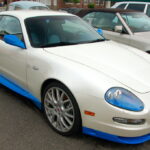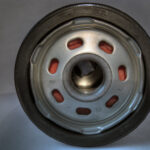[Solved] Clunking Noise When Accelerating and Decelerating
You are driving down the road, and you hear a strange noise every time you accelerate or decelerate. What could it be? Chances are, it is something simple that can be fixed with a little bit of work or it could be a warning that your car needs a visit to the garage.
In this article, I will discuss what could be causing your car to make a clunking noise when accelerating and decelerating, and how to fix it.
What is the Clunking Noise You Hear While Accelerating & Decelerating?
So, first, let’s discuss what the clunking noise could be. There are a few different things that could be causing this noise. There may be one or more worn-out components that may be a source of this noise. It could be due to motor mounts, struts, failed driveshaft, or transmission parts. If any of these components are at fault you will hear a clunking noise every time you accelerate or decelerate.
Also read: Are AWD Cars Good for Drifting? (Must Read)
Major Reasons for a Clunking Noise
So, precisely the major reasons for a clunking noise during acceleration or acceleration include:
- Worn Motor Mounts
- Damaged suspension components
- Worn Transmission Mounts
- Low Transmission Fluid
- Failing Driveshaft
Reason #1: Worn Motor Mounts
A common cause of a clunking noise while accelerating or decelerating is worn motor mounts. If your motor mounts are worn, they may not be able to properly support your engine, causing it to move around more than it should. This movement can cause the engine to hit other parts of the car, resulting in a clunking noise.
Signs of Worn Motor Mounts
There are a few signs that you can look for to see if your motor mounts are worn. First, check to see if your engine is vibrating more than usual. If it is, it is a good indication that your motor mounts are worn and need to be replaced. Additionally, you can pop the hood and look at the motor.
How much does it cost to replace and how long does it last?
The lifespan of motor mounts can vary depending on how often you drive and the conditions you drive in, but they typically last between 60,000 and 100,000 miles.
The cost of replacing motor mounts varies depending on the make and model of your vehicle, but it is typically a fairly inexpensive repair. The average cost of replacing motor mounts is between $200 and $600.
Reason #2: Worn Transmission Mounts
If your car is making a clunking noise every time you accelerate, it could be a sign that your transmission mounts are worn out.
Like motor mounts, transmission mounts are designed to keep your transmission in place. If they are worn, the transmission may be able to move around more than it should, which can cause a clunking noise.
Signs of a worn-out transmission mount
Transmission mounts can wear out over time due to normal wear and tear, or they may break if your car experiences a sudden impact. If your transmission mounts are worn out, it may be difficult to keep your car in gear, and you may notice a difference in the way your car drives. In addition, you may hear a loud noise from transmission points and feel excessive vibrations.
How much does it cost to replace the transmission mount?
Replacing transmission mounts can be expensive, so it is important to catch the problem early. Depending on the make and model of your car, replacing transmission mounts can cost anywhere from $200 to $300.
Also read: [Solved] Humming Noise After Wheel Bearing Replacement
Reason #3 Worn Suspension Components
Another common cause of a clunking noise while accelerating or decelerating is damaged or worn suspension components. Specifically, this can be caused by worn shocks or struts. If your shocks or struts are worn, they may not be able to properly support your car, causing it to bounce around more than it should. This can result in a clunking noise.
Signs of worn suspension components
There are a few signs that you can look for to see if your shocks or struts are worn. First, check to see if your car is bouncing more than usual when you hit a bump. If it is, it’s a good indication that your shocks or struts are worn and need to be replaced. Additionally, you can take a look at your shocks or struts to see if they are leaking oil. If they are, it’s another sign that they need to be replaced.
How much does it cost to replace struts and how long do they last?
The lifespan of shocks or struts can also vary depending on how often you drive and the conditions you drive in, but they typically last between 50,000 and 100,000 miles.
The cost of replacing shocks or struts will vary depending on the make and model of your car. However, you can expect to pay between $400 and $1000 for the parts and labor.
Reason #4: Low Transmission Fluid
A clunking noise, while the car accelerates, can also be caused by low transmission fluid. If your transmission fluid is low, it may not be able to properly lubricate your transmission, causing it to make a clunking noise.
Signs of low transmission fluid
You can typically tell if your transmission fluid is low if you notice a difference in the way your car drives or if you see a leak under your car. You might smell a burning odor from your car. In addition, the gear addition becomes very slow, and poor. Another sign is the poor acceleration of the vehicle. Most importantly, the warning light of the transmission fluid turns ON as its level drops.
Cost of Replacing Transmission Fluid
The cost of changing your transmission fluid varies depending on the make and model of your car, but it is typically a fairly inexpensive repair. The average cost of changing transmission fluid is between $80 and $250.
Also read: 3 Reasons Why Luxury Cars Depreciate so Quickly
Reason #5: Failing driveshaft
Another common cause of a clunking noise while accelerating or decelerating is a failing driveshaft.
The driveshaft is responsible for transferring power from the engine to the wheels. If it is failing, it may not be able to properly transfer power, resulting in a clunking noise.
How to tell if you have a failing driveshaft?
You may be able to tell if your driveshaft is failing if you notice vibrations coming from under your car or if your car seems to be struggling to accelerate.
How much does it cost to replace a drive shaft?
Replacing a failing driveshaft can be expensive, so it is important to catch the problem early. Depending on the make and model of your car, replacing a driveshaft can cost anywhere from $500 to $1300.
How to Eliminate Clunking Noise While Accelerating & Decelerating?
If your car is making a clunking noise while accelerating or decelerating, the first thing you should do is check your transmission fluid. If your transmission fluid is low, it may be causing your car to make a clunking noise. You can typically tell if your transmission fluid is low if you notice a difference in the way your car drives or if you see a leak under your car. Refilling the transmission fluid would fix the problem.
Once you have added transmission fluid, the next thing you should do is check your suspension. If your shocks or struts are worn, they may not be able to properly support your car, causing it to bounce around more than it should. This can result in a clunking noise. Replace the struts.
The next thing you should check is your driveshaft. If it is failing, it may not be able to properly transfer power, resulting in a clunking noise. Replacing it would fix the problem.
If you hear the clunking from the front end and vibrations. Then, you need to check the engine mounts. Replacing them may fix the problem.
Solving the problem of a clunking noise while accelerating or decelerating can be difficult, but it is important to figure out what is causing the noise. If you are having trouble pinpointing the source of the noise, it is best to take your car to a mechanic and have them take a look. They will be able to diagnose the problem and give you an estimate for repairs.
Depending on the cause of the noise, repairs can be expensive. However, catching the problem early can save you money in the long run.
How Can You Improve Engine Health and Life?
One way to improve engine health and life is by regularly changing your oil. Over time, oil breaks down and becomes less effective at lubricating your engine. This can cause your engine to run less efficiently and can cause wear and tear. By regularly changing your oil, you can help keep your engine running smoothly and help extend its life.
Another way is maintenance. Regular maintenance is key to keeping your engine running smoothly. Be sure to check your owner’s manual for specific maintenance recommendations. And if you are ever unsure about something, don’t hesitate to ask a mechanic. They can help you keep your engine healthy and extend its life.






